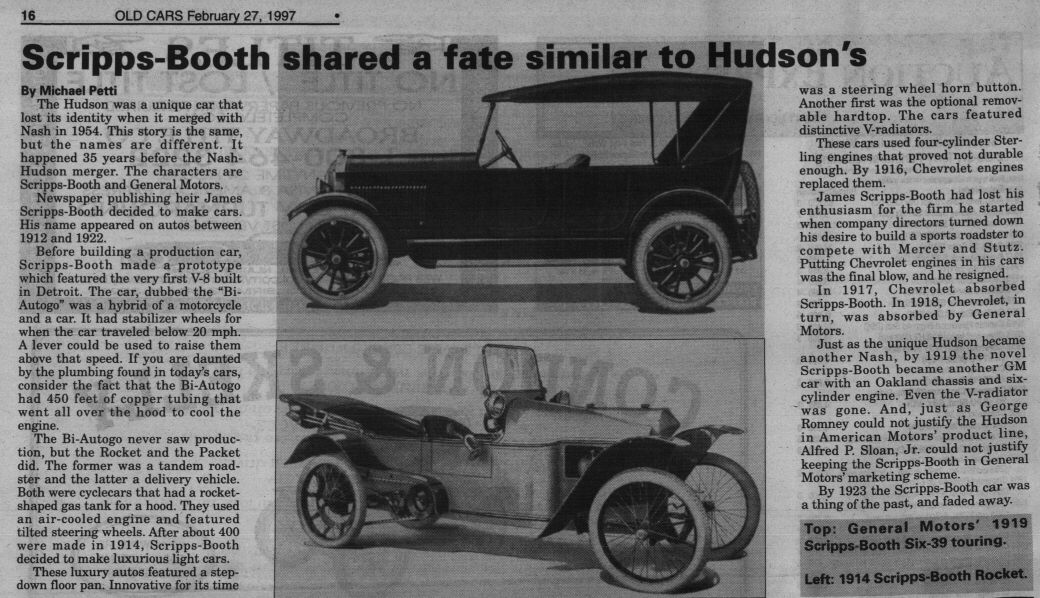
FEEDBACK TO REGISTER NO. 10
I am writing to help your have more information to keep the Scripps-Booth Register going. History on these cars seems hard to find. I have many ads I sourced or things purchased along with s/n 2525. Two years ago I went to Hershey and uncovered a strange puzzle piece of Scripps part, an alloy wire wheel cap and medallion in cracked and rough shape. The vendor and myself agreed it must have been off the spare as it probably would not be strong enough for a road wheel, and all others we have seen had been brass or steel. I tried to have an experienced friend heli-arc it after thorough cleaning, but he could not make it puddle and the arc went wild. Some how I was going across my literature and found the answer in an original 1917 newspaper ad the previous owner sold me. I am enclosing the "A B Shaw" ad from San Diego. I am sure this will raise some interest on how many of these specials remain. I can’t say much for the strength of these caps but they must have added a nice touch. I have never seen any make of car with a Houk hub cap like this! I am enclosing two Scripps ads with winter in mind, as I know you were looking for a winter scene last newsletter. I appreciate you mentioning my efforts on keeping Scripps news rolling in. I paid quite a price for my literature collection on Scripps-Booth autos. I wish other owners would come forward on sharing what appears to be out there on these autos. The Register has compiled quite a few cars now. I have more to share if others participate. My brother is working on getting us up and running with a computer. Work has been nil on our Scripps. I am trying to build work benches in the garage and put more peg board up before winter. We are already using the Franklin stove. I missed Hershey this year; our 3½ year old is keeping us busy. My 21 year old has been close by but plans to go back to San Diego. I tried to write George Geers about flying up his way to see his "D" remains. He had wrote me on November 19, 1995. I never received any response back. I changed jobs for about 2½ months, working in an exotic car shop. I worked mostly assembling an E-type coupe but we could not get along. I am back to my old job working on light planes. I hope this letter gets to you before the next newsletter gets together. Hope I have been some help. I watched the movie video, the Italian Job, and was thing of you and your "Mini." Alan and Sue Schier
SCRIPPS –BOOTH 1917 SPECIAL ON SHOW
While no change has been made in the general lines of this roadster, yet a decided mechanical improvement is shown. The motor has been more completely enclosed, the Wagner two unit starting and lighting system has been installed, and a number of minor improvements and refinements are in evidence. A. B. Shaw, the local distributor, reports the sale of roadsters to Miss J. K. Currier, of 2138 Dale street, and C. O. Bolts of Chula Vista SCRIPPS-BOOTH IN NEW FINISH
INCREASING INTEREST IN SCRIPPS-BOOTH CAR
I was most interested in the correspondence on old car matters in your June [MOTOR SPORT 1974] issue to the mention of a Scripps-Booth car, owned by a military predilection for this rare make, and I enclosed a photograph of my father in one while in the Army in Lucknow in 1924. He remembers one other in the same area, owned by another officer. I have had this photograph enlarged and some interesting details show up. The rear brakes only are of the external contracting type, there is a fine bulb horn, and the driver’s door cannot be opened when the spare wheel is being carried. The radiator cap is hard to make out but is either a small bust of the late Queen Empress or an oily rag and a cork. Regrettably, there is no rushing to Lucknow with a trailer to look for this car. It was totally wrecked very late one night when my father ran into an unlit water buffalo during a monsoon. Dr. Peter Edwards, Lower Hartwell FORMER OWNER’S ANNOUNCEMENT
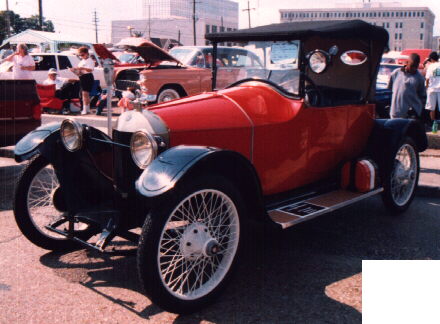
THE EX-JAMES COOK 1916 MODEL C MUSEUM WEB SITE NEWS
Other museums that also have web sites are the Owls Head Museum, Henry Ford Museum, Detroit Historical Museum, Auto World Car Museum (Dale Baker), Forney Historical Transportation Museum, Pioneer Auto Museum, and the Old Rhinebeck (Rita Palen). If you know of any other Scripps-Booth owners web sites, please let me know. WELCOME NEW REGISTER ADDITIONS
Glenn Wieties of Paradise, California has a 1918 Model 42 Four Passenger Coupe. This is the first coupe that we know of. Glenn heard about the REGISTER from my ad in the HORSELESS CARRIAGE GAZETTE NEW WEB SITE FINDS A 1919 SIX TOURING
Thanks for your reply. Here is some of the information on my car: 1919 Scripps-Booth, Model Six-39, 6 cylinder, 112" wheel base, 4-door Touring Car, Vee shaped honeycombed style grill, wooden wheels, original condition, 7,977 orginal miles, tool kit inside of drivers door. I am interested in a parts catalogue or other information you may have on it. Thanks again. EMAIL REQUEST FOR SERIAL NUMBERS
Your engine serial # should be stamped on the right hand center of the crankcase/block. An example of a 1919 number is: C 48000. Also there should be a chassis # stamped on an oval plate located on the side of the frame above the right rear axle. This plate states: SCRIPPS-BOOTH CORPORATION DETROIT, MICH, USA Model 34-S CAR No. 8000 (as an example). We are not sure what this chassis number stands for? And only the 1918-19 models have this chassis nameplate. After I receive these numbers, I will then be able to make a copy of the correct parts book for your car and engine and get it in the mail to you. Thanks again for contacting us. Do you know of any other Scripps-Booths that are not listed on the Register on the web? EMAIL REPLY WITH ALL SERIAL NUMBERS
LETTER FROM AUSTRALIA
In my travels around Australia, I came across a pile of rust among the weeds which, on closer inspection proved to be the remains of a late veteran or early vintage car. Nobody in the area to whom I spoke knew any of its history or even what sort of vehicle it was. From a superficial examination I guessed at it being an early 4 cylinder American light car of approx. 1500 cc capacity. This makes it pretty unusual as they were not noted for making light cars. I know they had a brief flirtation with them during and after WW 1, but most of their efforts went towards rather bigger stuff. I did not have much time to go into great detail like engine numbers etc. and I did not have a tape measure to measure wheel bases or track but I did manage to take a few indifferent photos. They only serve to refresh my memory and are not worth passing on. From scrutiny of the sparse information readily available on this marquee in Australia, I jumped to a hasty conclusion that it is a veteran (1918 or earlier in our terms) 4 cylinder Scripps-Booth. I am now seeking help in proving or disproving this assumption. The salient features which I used to form a rather nebulous opinion that it might be a Scripps-Booth are: - Houk type wire wheels (with split rims) - no badges left on the hub caps. - Aluminum crankcase. - Aluminum gearbox housing in unit with the motor - possibly 3 speed gearbox: - distributor ignition - horn button in centre of steering wheel -3 aluminum spark, throttle control and mixture levers (I assume that's what they are) I will greatly appreciate any help you can give and will keep you informed on my eventual findings and my decision. Yours sincerely John Stewart Rochedale, QLD, AUSTRALIA EDITOR’S REPLY TO FIND IN THE BUSH
Thank you for your letter concerning you find in the bush. It sure sounds like it is a late 1916 Scripps-Booth Model C with the enclosed Sterling 3" x 4 ¼" (120.2 CID-2 Liter) OHV engine with the famous Alanson Brush designed, external adjustable, rocker arms, that used pivot pins in the aluminum valve cover to adjust valve lash. The push rods are on the left side with the intake manifold and exhaust on the right side. This Brush design valve cover model started at engine serial No. 10000 (up to about 18000) that should be found on the right side crankcase at the base of number 1 cylinder. If the number is followed by a "C," it was built with cast iron pistons instead of Lynite (aluminum). The early 1915 Sterling engines had a 2 7/8" bore (under 3000, and 3001 to 9999 got the 3" bore but still had the open valve gear (no valve cover). The only other car that used this same Sterling engine was the 1917-18 Monroe M-3 Roadster, but it had a 96" wheel base with straight frame rails and came standard with wooden spoke wheels. The S-B Model C and Model G (1917-19, with an improved version of the Mason 3 9/16" bore engine as built for the Chev 490 – it had a aluminum valve cover, side push rod covers, and a water heated intake manifold) were famous for the big 3" round horn button on the center of the steering wheel. The engine numbers above 10,000 had Remy ignition with an automatic advance (early engines use Atwater – Kent that also had auto advance) so only had a single throttle control on the steering column. Maybe someone modified this car later to add a fixed spark distributor and an adjustable jet carby? The choke control rod is on the dash. Does these two extra levers have external control rods? The S-B hand throttle was directly under the wheel with rod inside column. Of course S-B was known for its Vee shape radiator and rather long 110" WB for a small car. The roadster had stagger seating and used piano wire cable to work the rear brakes. Also had a lever operated emergency brake, which the 490 didn’t have till the 22 models. The S-B Model C frame was unique. The side rails tapered in at the front axle and out at the transmission cross member, then tapers in again to the tail. It looks like a wide mouth glass Coke bottle! S-B used an open drive shaft so has a short Torque Bar between the diff and the rear frame cross member on the right side. Is this chassis RHD? S-B did export a lot of RHD Model C’s to England, but we only know of one RHD car, and its in the States. Let me know if you pick up this Scripps-Booth remains. I would be interested in photos and the engine serial # for the Register. Attached is a copy of the Register to give you some idea of serial numbers. I have most of the literature on the model C that I could copy for you if you get this car. While I don’t own a S-B, I have been trying to find a good 1917-18 Model G, I do own two Veteran Chevrolets, a 1912 Model Little 4 Runabout (engine #66), and a 1918 Model D "Eight" Touring (engine #538). I belong to the Chev Club in Australia, the VVCCA, and was at Forbes last year for its 30th Anniversary Rally – and plan to attend the 4 cyl only tour next year in NSW. As you know, Chevrolet secured both the Sterling and Scripps-Booth companies in 1916, before Chevrolet sold its controlling stock to GM in late 1918. I am the Technical Advisor for the Vintage Chev Club of America (VCCA) for the Whiting, Monroe, pre-GM S-B, and Little models, so my interest is in the Veteran Chevrolets/S-B’s. I am sending this letter via Email to a VCCA/VVCCA member in NSW, who is posting it directly to you. Do you ever run across Alan Carpenter from Buderim in the Veteran Club – he has a Little 4 Runabout too. EDITOR NOTE: I somehow trashed John’s email reply. It doesn’t now appear to be an S-B, but John is going to buy these bits and pieces anyway. Any guesses on what it is? ANOTHER LEAD IN NOVEMBER FROM NSW
ENGINE FOR SALE LEAD
Ray Stevers, 3209 NE Riverside, Pendleton, OR 97801 CAR AND PARTS FOR SALE
The car is still for sale. I’ve had a couple of nibbles since our ad last ran – no takers yet.
Also have a radiator, pedal assy. and steering wheel assy. for Model C that if someone is interested. (Radiator is square core version) I like receiving the newsletter and have learned a lot of info about our car, Thanks again, Barry Jenson Flushing, Michigan OWNER’S NEWS AND CORRESPONDENCE
I received Christmas Holiday [1997] cards with words of encouragement from Elizabeth Downing of Macomb Illinois and Rodney Anderson of Western Australia.
Enclosed please find a picture of our Model C Roadster completely restored after 10 years, The motor and clutch and transmission were completely overhauled and a brand new top installed. The wire wheels were powder coated and the seats redone. The exterior paint is a metallic Maroon and the fenders black. The underneath is painted black and the motor blue - my own colors. Please come by anytime. [I stop by after the Turlock Swapmeet in January to meet the Popes and see this fresh restoration.] The car really looks good and runs great. Also starter and generator were completely overhauled and the brakes returned to original cables. Bud and Grace Pope Fresno California I received Issue #10 of the Register and, as a relative of JSB, enjoyed reading it very much. That is in spite of having worked for Ford in Dearborn for 25 years or so, Chevy is a very foreign word. I restore Jaguars for my hobby now and am involved as a director of the national club. I have some old blue prints of drawings made by JSB after W.W.II. When I get a chance I will write observations of them for the Register if you would like. Both of my sons are real motor heads also, each owning 2 British sports cars. Peter raced a MG Midget and was class champ at Waterford Hills north of Detroit this past summer. Thank you for your service to the brand and to the family. Jim Morton Greensboro, North Carolina FROM CARS AND PARTS MAGAZINE
IT’S A SAGINAW BLOCK!
Northway had been the sole-supplier of engines for a number of years to Oakland, Oldsmobile, and GMC Truck. This six had been in production since 1916 as the Northway Model 110 in the 1916 Oakland, to be followed by the Oldsmobile six in 1917, and the Scripps-Booth six in 1918. Northway was purchased by W.C. Durant for the growing General Motors Corp. in 1909. 1t was reported for the year 1912 that Northway was making 11,000 engines a year. Oakland was then the largest single customer, buying 5.000 engines, with the rest of Northway's production spread among 12 other car and truck assemblers. By the early '20’s, because of growth volume and a lack of design control, both Oakland and Oldsmobile moved away from outsourcing their engines, and began to build their own engines. In the end, the Northway engine was known only as a truck engine, with GMC Truck becoming its only customer. In mid-1925 the Northway Motor and Manufacturing Division was transferred out from under the Inter Company Parts Group to direct operation and Control under the GM Truck Division. After Yellow Truck and Coach Manufacturing Co. purchased the GM Truck Division in September 1925, the Northway division was quietly disbanded. By March 1926, the Northway property in Detroit, wbich was by then called GM Truck Plant No.7, was purchased by Chevrolet for the manufacture of front and rear axles and parts for past model Chevrolets. The casting trademark that looks like a cloverleaf with the letters SPC Inside, is the logo of Saginaw Products Co., which was formed under GM's Inter Company Parts Division in 1919. SPC built a new Grey Iron Foundry during 1919 to supply raw engine blocks, cylinder beads, and miscellaneous engine castings, that up to that time were purchased from outside vendors. The new SPC Grey Iron Foundry had enough capacity to also supply block and head castings for the Saginaw Motor Plant, Northway Motor and Manufacturing, and Chevrolet's Flint Motor Plant. I have seen many Chevrolet blocks and heads from the early '20's up to mid-1927 that have the SPC cloverleaf casting symbol mark. Since Chevrolet was SPC's largest customer, the Grey Iron Foundry was turned over to Chevrolet In September 1927, and was renamed the Chevrolet Grey Iron Foundry. NEW INTERNET WEB PAGE
EMAIL AND WEB SITE ADDRESS
The Whiting, Scripps-Booth, Monroe, and Pre 1925 Vintage Chevrolet Web Site can be access from webcrawler or: http://home.earthlink.net/~scrippsbooth/
The below article is reprinted from OLD CARS, February 27, 1997, with permission. However, it is more correct to state Chevrolet gained control of the Scripps-Booth Corp. in 1916, and Mason engine and transmission replaced the Sterling engine for the 1917 Model G that first appeared at the January Automobile Shows.
|
|
| Merry Christmas and Happy Holidays everyone! |
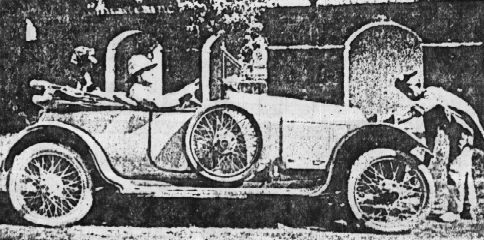
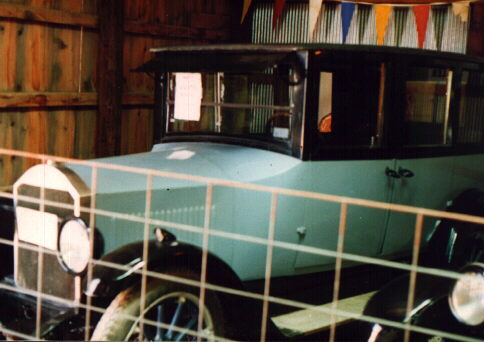
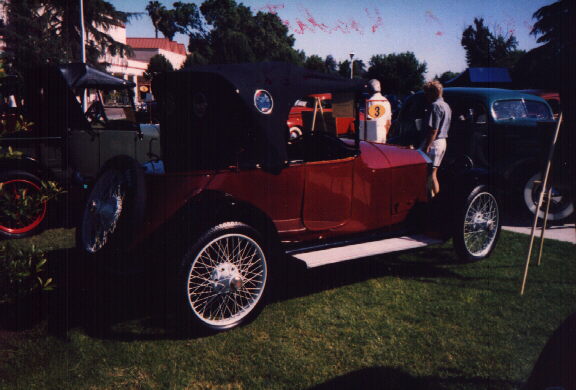
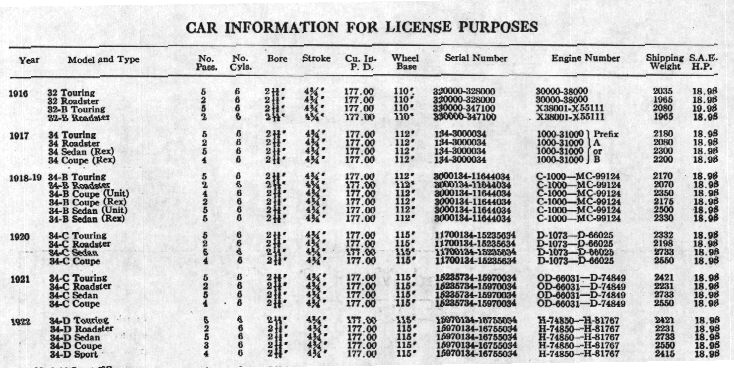 I bought an Oakland Master Parts Book at the Portland
Swapmeet this last
year that had this serial numbers listing. It appears
that Northway assigned
the "C" prefix to its Model 110 engine used in the
1918-19 Oakland 34-B
chassis and the 1918-19 Scripps-Booth Six chassis. It
is reported that
Oakland supplied its 1918-19 112 inch wheel base
chassis, that was assembled
in Pontiac, and shipped them down to the Scripps-Booth
factory in Detroit.
These Oakland sourced chassis are identified by an
oval nameplate attached
to the frame above the right rear axle. The Model of
these chassis is "34-S"
with the 34 being the Oakland Model used for 1917 to
1922. The "S" probably
stood for Scripps-Booth. For 1920-21 Northway used the
"D" prefix on its
Model 111 engine after building 100,000 of the "C"
prefixed engines. Since
all 1920-21 Scripps-Booth Model B known engines have a
"BD" prefix, it
is assumed Northway added the "B" to identify that
this engine was used
in the Scripps-Booth Model B chassis.
I bought an Oakland Master Parts Book at the Portland
Swapmeet this last
year that had this serial numbers listing. It appears
that Northway assigned
the "C" prefix to its Model 110 engine used in the
1918-19 Oakland 34-B
chassis and the 1918-19 Scripps-Booth Six chassis. It
is reported that
Oakland supplied its 1918-19 112 inch wheel base
chassis, that was assembled
in Pontiac, and shipped them down to the Scripps-Booth
factory in Detroit.
These Oakland sourced chassis are identified by an
oval nameplate attached
to the frame above the right rear axle. The Model of
these chassis is "34-S"
with the 34 being the Oakland Model used for 1917 to
1922. The "S" probably
stood for Scripps-Booth. For 1920-21 Northway used the
"D" prefix on its
Model 111 engine after building 100,000 of the "C"
prefixed engines. Since
all 1920-21 Scripps-Booth Model B known engines have a
"BD" prefix, it
is assumed Northway added the "B" to identify that
this engine was used
in the Scripps-Booth Model B chassis.
